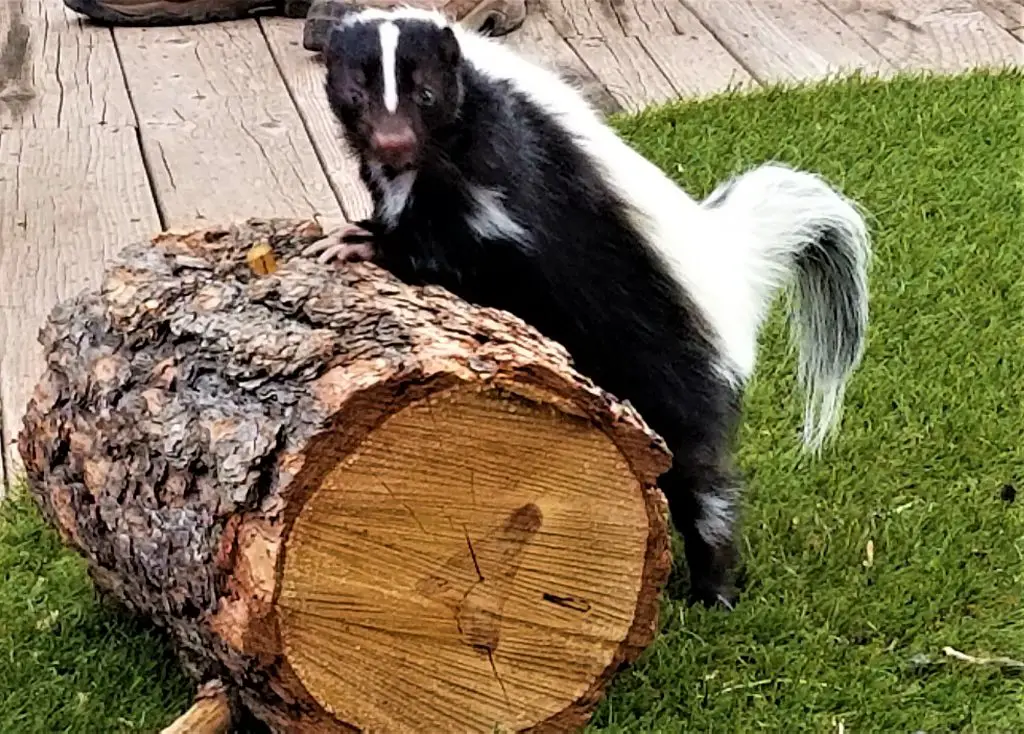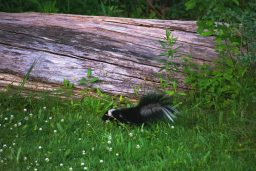Keeping skunks out of your yard is simple: either try to avoid your yard being a skunk hot-spot – or put up a 4ft sheet metal fence (2ft of it underground).

How Do You Keep Skunks Out Of Your Yard?
Skunks have particular habits, places they go, and things that they like. They also have things that they just love to do – especially when feeding – that we humans get annoyed at. Like raiding our garbage or hiding in the garage.
So one of the best ways to avoid skunks coming into your yard is to hide, prevent or remove all these things from your property. That way they either pass straight through (like humans at a closed mall) or choose someplace else in the first place (like the other mall that advertised 50% off everything).
Hide The Food:
Skunks are carnivores – just like your dogs and cats – so your pet food smells great for skunks too. Leaving pet food out in dishes overnight is like having a big sign saying ‘come on in’ – and not just for skunks – raccoons, coyotes, and bears think the same too. You need to remove these dishes from your yards or properties at night – and make sure they aren’t left out when your animals have already been fed. Skunks spray can be really harmful to your pets too – so best avoid any disagreements over food.
Clear Your Lawn:
If you grow your own food or have fruit trees – then you need to keep on top of food waste and compost. Skunks absolutely love feasting on insects – and rotting food and plant material is the perfect place to dine. Leaving fruit on the lawn – or clipping/cuttings from elsewhere – just increases the chances of insects multiplying – or worse still – attracting mice and rats (which skunks also love to eat). Double trouble!
Secure Your Outbuildings:
Skunks are very inquisitive with very strong claws – so leaving doors and windows open can be a calling card for a hungry skunk. If they were attracted to a home by the smell of something tasty and got in – they will be back. Never use food to lure a skunk out of your house – as it just makes your home more appealing to them. Having an open or unprotected grain store or outdoor pantry will make them prime targets too – even though the skunks usually just eat rodents and bugs (aka garden pests).
Keep Buildings Clear:
And it isn’t just about feeding. Skunks are always on the lookout for a secure den, and a disused outhouse or overgrown and undisturbed patch in your yard could well see a family move in. They can climb trees too (well Spotted Skunks can at least) and so overhanging trees and similar structures leaning up to your roof, or any other buildings, could be offering a red carpet to a new home.
Protect Your Boundary:
Skunks are usually more ground-dwelling – so well-maintained, tall, solid fences are suitable to deter a skunk – especially if they don’t smell food in your yard. However, some skunks can climb all but a sheet metal fence – and they can all dig down to around 2ft under the fence to get through. Serious defenses are needed if you really want to keep them out. Similarly, filling in any holes and possible den sites both inside and outside (if possible) could increase the distance from your property that a skunk can set up home in the first place.
Can the Same Scent Repel Both Raccoons and Skunks?
Can scent repellents for keeping raccoons away also work against skunks? Both animals have a strong sense of smell, so using scents can be effective. Certain repellents, like ammonia or predator urine, can deter both raccoons and skunks. However, it’s essential to choose the right repellents and use them strategically to ensure maximum effectiveness.
Are Foxes Able to Climb Trees to Get Into Yards?
Yes, foxes are agile climbers, making it possible for them to reach yards by climbing trees. Their sharp claws and limb dexterity enable them to navigate and scale tree trunks effortlessly. This ability allows foxes to access food sources, escape predators, or find suitable shelter, showcasing their adaptability in various environments. Can foxes climb trees? Absolutely.
Do Elephants Have Fur or Hair that Skunks Are Attracted to?
Elephants and their hair or fur differ from skunks, as elephants possess coarse hair that is scattered across their bodies but not in large quantities. Skunks, on the other hand, have fur that is soft and dense. It is these differences in hair and fur that do not necessarily make one attract the other, as skunks are not specifically drawn to elephants solely based on their hair or fur.
Do Skunks Climb Up Trees?
Luckily – most skunks can’t climb up trees. However, they can climb to a certain degree – so always consider this when trying to prevent them from entering your property or home. They are mainly fossorial (living on and under the ground) – but when young, hungry, or in search of a mate – they can try just about anything. Mischievous or persistent skunks may well manage the climb up or over something that ordinarily would be a great deterrent.
Only the Spotted Skunk could actually manage to successfully climb a suitable tree to any great height – and this is all it would take for them to set up home in your loft or other buildings. Once they have moved in – you need to start to annoy them (from a distance) by partially blocking the entrance to their den; making a noise; using bright lights, or removing their food source – and they should soon move on. They want an easy life – so if their den isn’t a safe place – they will go find another.
Skunks do need someplace warm to sleep in winter to survive – and a place in spring to raise their pups – so do think about leaving them alone if they aren’t causing you any harm.










